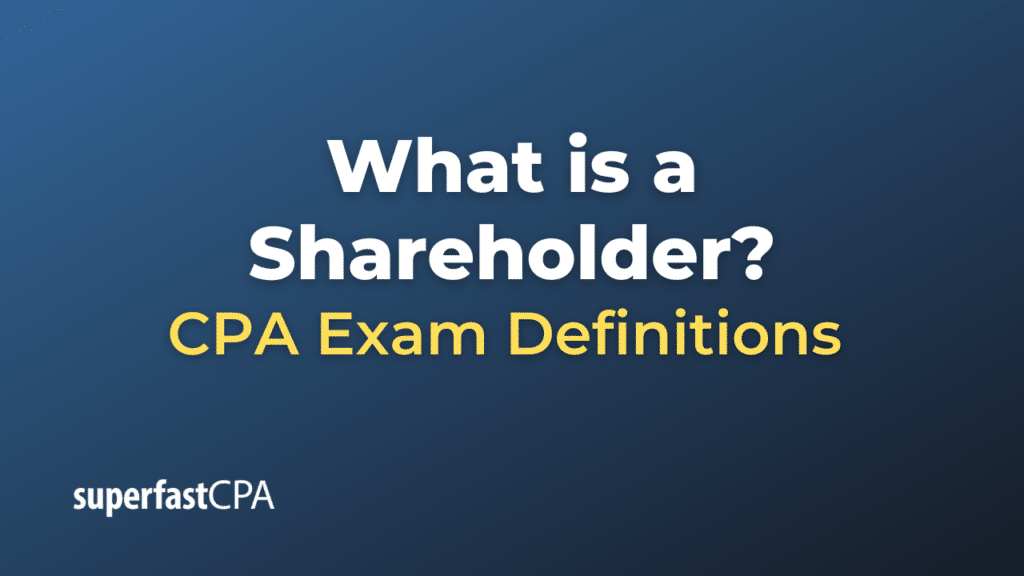Shareholder
A shareholder, also known as a stockholder, is an individual, institution, or entity that owns shares (or stock) in a corporation or a mutual fund. As part-owners of the company, shareholders have a stake in the corporation’s assets and earnings. Their ownership proportion is determined by the number of shares they hold relative to the total number of outstanding shares of the company.
Here are some key points related to shareholders:
- Rights and Privileges: Shareholders often have certain rights associated with their ownership, such as:
- The right to vote on certain company decisions, including the election of board members.
- The right to receive dividends if the company decides to distribute them.
- The right to a proportionate share of the company’s assets in the event of a liquidation, after debts and other obligations are met.
- Types of Shares: Shareholders might own different types of shares:
- Common Shares: Owners typically have voting rights and might receive dividends. They have a claim to assets only after bondholders, preferred shareholders, and other creditors have been paid in the event of liquidation.
- Preferred Shares: Owners have a higher claim on assets and earnings than common shareholders. They typically receive dividends before common shareholders and may or may not have voting rights.
- Risk: Being a shareholder comes with risks. The value of shares can fluctuate based on company performance, industry trends, and broader economic factors. If a company performs poorly or goes bankrupt, its shares might lose value, potentially resulting in losses for the shareholders.
- Institutional vs. Retail Shareholders:
- Institutional Shareholders: These are large entities, such as mutual funds, pension funds, and insurance companies, that manage pooled funds from many investors and invest in stocks, bonds, and other securities.
- Retail Shareholders : These are individual investors who buy and sell securities for their personal accounts, often in smaller quantities than institutional shareholders.
- Beneficial vs. Registered Shareholders:
- Beneficial Shareholders: These shareholders own their shares through an intermediary, like a broker. While they are the true owners and beneficiaries of the shares, their names might not be directly listed on the company’s official shareholder register.
- Registered Shareholders: These are shareholders whose names are listed directly on the company’s official shareholder register.
Being a shareholder means having an ownership stake in the company, and with that comes both potential rewards (like capital appreciation and dividends) and risks (such as potential loss of investment).
Example of a Shareholder
Let’s illustrate the concept of a shareholder using a fictional scenario.
Example:
Imagine a company called BlueOcean Tech Ltd., a promising startup that specializes in developing sustainable ocean-cleaning technology.
- Initial Investors:
- At its inception, BlueOcean Tech Ltd. was funded by three friends: Alice, Bob, and Charlie. Each invested an equal amount, so each owned one-third of the company’s shares, making them the initial shareholders.
- Public Offering:
- Retail Shareholder:
- David, an individual investor, purchased 100 shares of BlueOcean Tech Ltd. during the IPO, making him a retail shareholder. He believes in the company’s mission and hopes his investment will grow over time.
- Institutional Shareholder:
- GreenFund, a mutual fund that focuses on environmentally-friendly companies, purchased 50,000 shares during the IPO. This makes GreenFund an institutional shareholder of BlueOcean Tech Ltd.
- Shareholder Rights:
- Later that year, BlueOcean Tech Ltd. called for an Annual General Meeting (AGM). Both David and GreenFund, being shareholders, received notices for the meeting. They have the right to vote on various decisions, including electing new board members. If the company declared dividends, both would receive their proportionate share based on their holdings.
- Market Fluctuations:
- Over the next year, BlueOcean Tech Ltd. successfully launched several ocean-cleaning initiatives, leading to positive press coverage. As a result, the company’s share price rose. David’s and GreenFund’s investments in the company appreciated in value.
- However, if the company had faced challenges or negative publicity, the share price might have dropped, and both David and GreenFund could have experienced losses on their investments.
This example showcases various aspects of being a shareholder, from initial investors to retail and institutional shareholders, and the potential benefits and risks associated with owning shares in a company.












